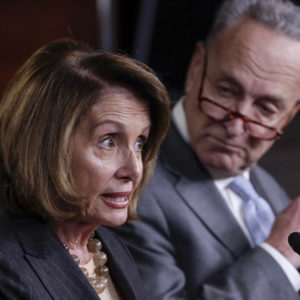NBC reported recently that 42 of the party’s nominees for House seats and nine incumbent Democratic lawmakers won’t back Nancy Pelosi for speaker if the Democrats regain the House of Representatives this fall. Should she step aside for the good of her party? Here are five reasons it would be a mistake for Democrats.
First, Nancy Pelosi is one of the best fundraisers the Democrats have ever had and that’s important when you have as many close House contests as there are this year. Pelosi raised nearly $50 million for Democrats in 2017. She’s raised $700 million since she joined the Democratic leadership team in 2002, and her fundraising prowess is impressive again this year. Her tireless fundraising could give many Democratic candidates the boost they need to win this fall.
Second, she’s a woman. Voting or easing out the top elected Democratic official in the year of the pink wave would be an embarrassment to the party that prides itself on being a staunch advocate for women. It is one thing to have disagreements about the direction of the party, but it is quite another to throw your top leader, the first female speaker of the House, out. She’s led her party for the last 15 years.
Third, if you are going to kill the queen, you need to know who and what comes next. After the 2016 election, nearly a third of the Democratic caucus voted for someone other than Pelosi, the most opposition she has ever had. Pelosi is 78 years old and some in her party are arguing that the Democrats need a new younger leader and team. While that may be true, there is no obvious successor who can step into her shoes right now and present a fresh face for the party. Representative Joe Crowley, the fourth ranking member of the Democratic leadership, was rumored to be a strong favorite, but his defeat by Alexandria Ocasio-Cortez dashed his hopes. There is no successor who has her strengths. “Democrats in Disarray” isn’t a headline a party wants.
Fourth, in her leadership position, she’s straddled the factions within the party while remaining true to her liberal roots. And she’s been effective. My former AEI colleague Tom Mann once said that she was the “strongest and most effective speaker of modern times.” Pelosi corralled the troops for Barack Obama and deserves credit for helping to pass his stimulus plan and the Affordable Care Act.
Fifth, she’s a tough street fighter, most recently taking on the media in response to stories that she should step aside. She accused NBC of being on a “jag as one of their priorities to undermine my prospects as speaker” after the guest host for the program asked if she would be willing to give up the gavel and give it to a new generation of leaders if the Democrats retake control. “I do not think our opponents should select the leaders of our party,” she said. “The Republicans are spending millions, tens of millions of dollars against me because they’re afraid of me … because I out-raise them in the political arena, because I outsmart them at the negotiating table, and because I’m a woman who is going to be (at) a seat at that table.”
When Morning Consult and Politico asked people recently who should be the speaker if Democrats take control, Pelosi was the top choice of self-identified Democrats at 32 percent followed by Ohio Democrat Tim Ryan at 13 percent and House Minority Whip Steny Hoyer at 4 percent. Thirty-eight percent of Democrats were undecided or didn’t give an answer. It’s not clear how much the poll means. Pelosi’s standing no doubt reflects her strong name identification, but it also reflects years of effective work for her party.
Both Nancy Pelosi and Paul Ryan have low approval ratings. In their highly visible positions, they are lightning rods for the opposition. Many Republican attack ads feature Pelosi, hoping that her unpopularity nationally will help them win key races. That could happen this fall in some contests, but Democrats should think carefully about what might be lost if Pelosi steps down.

